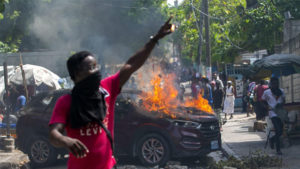 UNITED NATIONS — The U.N. envoy for Haiti warned Monday that Latin America’s poorest country has seen increasing violence in recent months, with gangs challenging the authority of the state and political divisions blocking movement toward legislative elections.
UNITED NATIONS — The U.N. envoy for Haiti warned Monday that Latin America’s poorest country has seen increasing violence in recent months, with gangs challenging the authority of the state and political divisions blocking movement toward legislative elections.
Helen La Lime painted a grim picture of life in Haiti to the U.N. Security Council, saying the country “is once again struggling to avert the precipice of instability.”
Haiti has been roiled by street protests and economic stagnation for much of President Jovenal Moise’s time in office since February 2017 as opposition leaders demand his departure. They say he has mismanaged the economy and failed to prosecute years of unbridled corruption that siphoned billions in international aid into bank accounts overseas.
His opponents have failed and Haiti’s parliament shut down in January because of the chaos, eliminating the check on presidential power that paralyzed Moise for years. He is now ruling by executive order.
La Lime said that “in the past months, unrest — sometimes in the form of violent protests — has become increasingly prevalent, and perceptions of insecurity have grown ever more acute.”
“Gangs continue to challenge the authority of the state, especially in the more populous neighborhoods of Port-au-Prince,” she said. “And a fringe group of disaffected police officers calling themselves ‘Fantom 509’ has, along with its followers, brought disorder to the capital on several occasions.”
She said the key to free and inclusive elections lies with Haiti’s political and economic classes — whether they can compromise without resorting to violence, and whether the country’s fledgling institutions can take the necessary steps to ensure fair voting.
Roberto Alvarez, the Dominican Republic’s foreign minister, told the council his country, which shares the island of Hispaniola with Haiti, “is gravely concerned by the large-scale social, economic, health and political crises currently rocking the sister republic.”
The crisis is marked by the lack of a political agenda and “the fact that the organization of legislative elections has come to a standstill,” he said, and it “has worsened to such an extent that good governance is impossible.”
“Violence and impunity continue sowing devastation and continue to affect the smooth functioning of daily life,” Alvarez said.
The Dominican minister recalled his country’s warning to the Security Council last year that its decision to withdraw a U.N. police training and monitoring mission from Haiti on Oct. 15, 2019, was premature because “the appropriate conditions” hadn’t been met.
The Security Council replaced a full-fledged peacekeeping mission deployed after Haiti’s devastating earthquake in 2010 with the police mission in 2017. That mission was replaced with a smaller U.N. political mission that La Lime heads.
Alvarez said the Dominican Republic hopes the “mistake” in withdrawing the police mission will be avoided in other U.N. missions.
La Lime said police and judicial authorities have struggled to meet the Haitian people’s “legitimate demands for security and accountability.”
“Although the Haitian National Police has consistently proven its operational proficiency since assuming some responsibility for providing security throughout Haiti’s territory,” she said, “it would require at least an additional 10,000 well trained and equipped police officers to meet internationally accepted policing standards and cement its capacity to deliver professional, human rights compliant police services to the population.”
